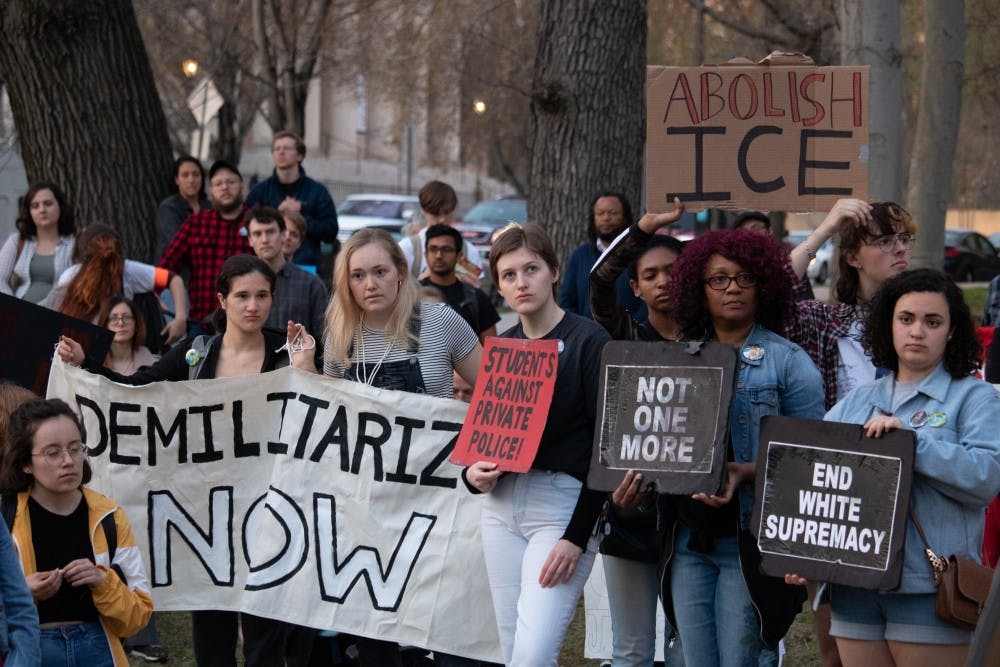Members of the Hopkins and Baltimore community gathered at the Harriet Tubman Grove for the second Rally and March to Demilitarize Hopkins on Wednesday, April 11. The protest was organized by Students Against Private Police (SAPP), the Hopkins Coalition Against Immigration and Customs Enforcement (ICE) and organizers of West Wednesdays. Protestors demands include an end to University contracts with ICE, stopping the private police force initiative and justice for Tyrone West. Demonstrators later marched to Garland Hall, where protestors have held a sit-in for the past week.
West Wednesdays have been held every Wednesday for the past six years in honor of Tyrone West who died in police custody in 2013. Morgan State University police officers were investigated for his death.
Drew Daniel, Professor in the English Department and creator of the petition to end ICE contracts, attended the rally. He noted that if a private police force were instituted, what happened to West could happen to a student on Hopkins campus.
“Tyrone West was killed on the Morgan State campus by armed private police - his death is a direct counterexample and it’s a warning to us all in the Hopkins community about what we don’t want to have happen on our own campus,” he said.
State Senator Jill Carter, representing the 41st district, spoke at the rally in support of the students participating in the sit-in and condemned police brutality. Multiple family members of victims of police brutality gave accounts about the lasting effects of losing a loved one to police violence.
West’s sister, Tawanda Jones spoke to The News-Letter about the importance of the sit-in.
“My brother was brutally murdered. That’s why it’s important to me and why Hopkins trying to bring a private police is a big problem. So I’m saying no to private police, no to ICE and I definitely want accountability for my brother Tyrone West,” she said.
Andrea Fraser, a member of SAPP, explained the timing and significance of protests, which coincide with West Wednesday.
“[Ending police brutality] is one situation that Johns Hopkins can get behind and put the power as we have as a university to demand justice for someone in our community,” Fraser said.
Bentley Addison, media liaison for SAPP, was pleased with the turnout for the rally.
“This March was an amazing display of how the people feel— Hopkins community, Hopkins Faculty, Hopkins students and Hopkins workers feel about this and stand in solidarity with us and the sit-in,” he said.
Though members of SAPP and the Hopkins Coalition Against ICE participated in the rally, they maintained their presence in Garland Hall.
Peter Weck, member of Teachers and Researchers United, a graduate student workers advocacy group, spoke about the effects of the University’s contracts with ICE.
“When an institution like Hopkins provides medical training for ICE, it provides a veneer of professionalism to this agency whose basic purpose, its basic premise for existence is immoral and brutal. By ending these contracts, it would help open up the political space for the deportation machine to be dismantled or at the very least reformed,” he said.
Sophomore Gabe Silveira is a member of SAPP. He condemned the re-institution of a policy which requires those entering Garland Hall to show their Hopkins ID.
“Hopkins admin, as of yesterday, has enacted an identity checkpoint at Garland in efforts to drown our movement. This is a completely classist act on behalf of Hopkins that not only exacerbates the notion that black and brown students don’t belong on our campus, but it also closes off the community members that have been an integral part in this movement,” he said.
However, Vice President for Communication Susan Ridge wrote in an email to The News-Letter that these are not new policies.
“Community members are welcome on the Johns Hopkins campus. For safety purposes, the building access policy for Garland Hall requires visitors to either show ID or sign in, and all protest participants are expected to abide by these standard building protocols,” she wrote.
Anna Brackett and Maddie Wolf are students at the Maryland Institute College of the Arts. They participated in the sit-in as well as a protest held during a breakfast between University President Ronald J. Daniels and alumni. They spoke during the rally and criticized the racist comments that students of color experienced from the alumni.
“We marched into that alumni breakfast and you know what I didn’t get asked as a MICA student— I did not get asked if I belong here, but the people of color who do go to Hopkins did. That blatant racism we saw at that breakfast for the richest alumni donors was absolutely unacceptable,” she said.





